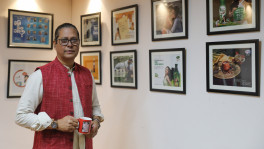Intellectuals . . . embodiments of history, voices of conscience
This morning, in deep reverence to the intellectuals we lost on the eve of liberation forty-eight years ago, it is time to celebrate the courage of conviction with which they lived and died

The martyred individuals we remember this morning lived and died for a cause. They were intellectuals who, when they lived, added increasing doses of substance to the cause of Bengali nationalism. In death, brought on by elements historically afraid to counter reasoned discourse with academic arguments, they have remained symbols of the enlightenment a society expects from its thinking classes. Their lives and then their tragic deaths have underpinned our claim on the present and pointed the path to our future.
That is as it should be, for intellectuals everywhere have been the creators of philosophies which have deepened human understanding about the place of men and women in the universal scheme of things, indeed about their perceptions of the societal landscapes they have been part of. Intellectuals by their very nature guide the engine of national aspirations and where such aspirations come under threat from organized and entrenched power, it becomes the often arduous responsibility of intellectuals to speak truth to power, to remind those imprisoned in straitjacketed hubris of the fleeting nature of all glory.
It is thus that Romila Thapar dwells on the role that public intellectuals must remain focused on as they confront the forces of negativism. And what must public intellectuals do in defence of the causes they hold dear? The simple response to that question revolves around the idea of objectivity such intellectuals must bring to bear on the issues they seek to address in their quotidian approach to life and all that it entails. An intellectual needs to have a sweeping view of the valley before him or her. In essence, an intellectual cannot afford to be fettered by sycophancy or by a partisan observation of contemporary politics. Partisans are no intellectuals. They are a negation of philosophy. Of course intellectuals are not necessarily politicians, though politicians have often been perceived to tend toward the philosophical. Overall, though, it remains the responsibility of intellectuals to remain undaunted by power, to not cower before the weapon of intimidation wielded by those on the commanding heights of power.
It was such courage which defined the brave Bengalis who were marched by their assassins to the brutality of sudden death in December 1971. They died because they lived by a cause. In our times, as proved time and again, causes matter. And causes are best sharpened and disseminated by intellectuals. Proof of it is to be had in the profundity of logic coming from Serajul Islam Choudhury here in Bangladesh and, over there in India, in the form of Ramachandra Guha, Raveesh Kumar and Sudheendra Kulkarni. These men have been part of a historical club peopled by such giants as Andre Malraux and Bertrand Russell. Charles de Gaulle, an embodiment of the philosophical on his own, comprehended the power of and need for Jean-Paul Sartre. Asked why he did not act against the philosopher who had endlessly been snapping at him, he had a simple and yet profound response: one does not arrest Voltaire.
As we observe yet one more sad anniversary of the murder of our intellectuals by the local collaborators of the Pakistan occupation army in 1971, it becomes an imperative for us, at every space we occupy as citizens, to underscore the place of intellectuals in our collective life. Silence in the face of corruption and coercion plays no part in the life of an intellectual, for intellectuals are not only living and breathing pointers to the destiny of nations but also keepers of political conscience everywhere. It was thus that John Kenneth Galbraith and Arthur Schlesinger upheld the values of a liberal America. It was thus that Walter Lippmann's worries about the war in Vietnam had Lyndon Johnson rethink the options before his embattled presidency. Political classes that listen to philosophers, to public intellectuals, are best positioned to turn their nations around, toward goals encompassing the ideal of the greater good for the greater number.
In our times, Eric Hobsbawm's analyses of history have been for us stepping stones to a deeper understanding of movements that have progressively changed our perceptions of human endeavour. Claude Levi-Strauss and Tariq Ali, brave men by any measure, have not flinched from exposing the flaws of men self-propelled into myopia before the larger canvas of historical movement. In newly sovereign Bangladesh, Bangabandhu was well-served by such illustrious intellectual giants as Khan Sarwar Murshid, Khan Shamsur Rahman and Azizur Rahman Mallick. In the depressing era of the autocracy-dominated 1980s, Waheedul Haque defied the powers that were as he flailed away at the darkness hovering over the land. Potua Quamrul and Shawkat Osman made sure that the lights did not go out of our lives. Away in Pakistan, the revolutionary poet Ibrahim Jalees withstood the lashes of a regressive military regime and sang the songs of resistance. Faiz Ahmed Faiz, I.A. Rehman and Asma Jahangir, clearly some of the foremost public intellectuals in their country, drove fear into the ruling classes through their fearless assaults on the arrogance of power.
This morning, in deep reverence to the intellectuals we lost on the eve of liberation forty-eight years ago, it is time to celebrate the courage of conviction with which they lived and died. They gave of their ideas. They gave of their blood. In the end, they strengthened our hold on our destiny by thus giving us the wherewithal to dig deeper roots into our consciousness of nationhood. Their human rights denied them in those final hours of life, they yet left us the message that freedom of thought, that human rights, that decency, that unalloyed democracy were principles upon which life must govern itself.
And where these principles are muzzled, where the voices of reason are not heard, it becomes the task of the intellectual to rise to the occasion even though repercussions dire may stare him or her in the face. The intellectual must challenge wrong perpetrated anywhere. The intellectual must challenge, in noble fury, the challenges that seemingly entrenched power throws his or her way.
Federico Garcia Lorca in Spain and Victor Jara in Chile are recalled this morning, as our own flag bearers of conscience, bludgeoned to death by a murderous state close to half a century ago, are remembered.


 Keep updated, follow The Business Standard's Google news channel
Keep updated, follow The Business Standard's Google news channel















